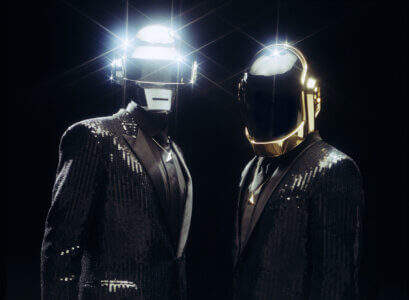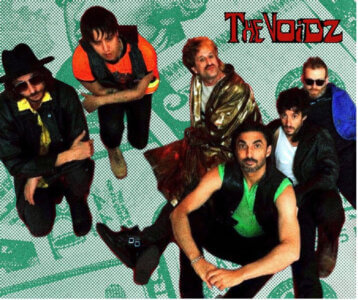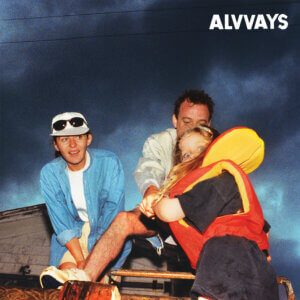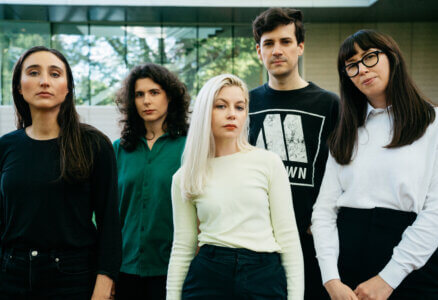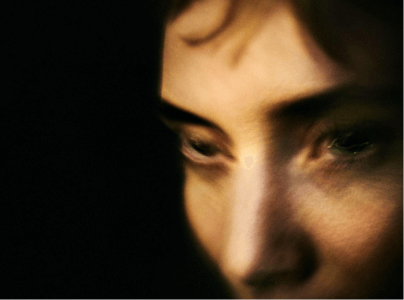Talking with Diego Solórzano of Rey Pila
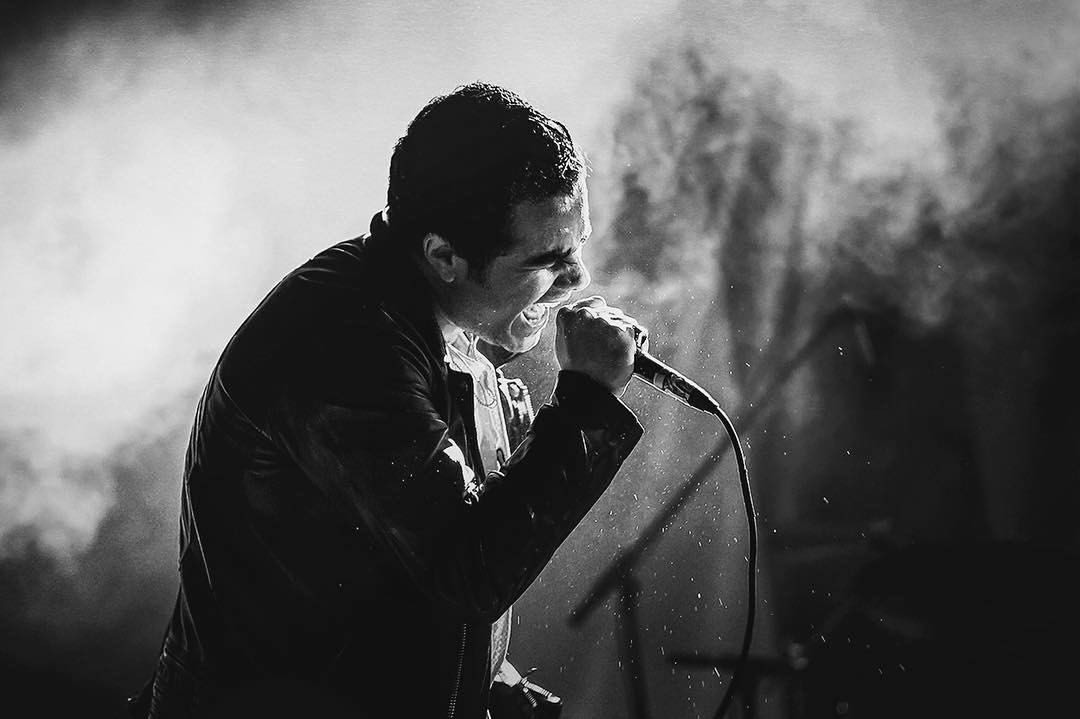
In 2008, after splitting from his band, Mexican rocker Diego Solórzano began working on a new project that involved the heavy use of synthesizers and a lot of 80s rock inspiration. Diego would call this project Rey Pila, which means ‘King Battery’ in English, and comes from a Jean-Michel Basquiat painting. Rey Pila’s debut self-titled album would be released in 2010 to critical praise and keen listeners.
People quickly began to take note of Rey Pila’s sound, one of them being Julian Casablancas of the Strokes. A relationship between Diego, the band members he added to the project, and Casablancas was formed, culminating in the band signing to Julian’s Cult Records in 2013. Two years later, Rey Pila would release Future Sugar , a testament to the band’s ingenuity, ultimately bringing them closer to permanence within the American rock ‘n’ roll scene.
Today, Rey Pila prepares for their next release, their Wall of Goth EP coming out tomorrow. On the new project, the band has polished their synth-rock sound and added more grit, which has caused the band to appear more edgier than listeners are used to. Wall of Goth is a bold project, and it ought to make you excited to see what’s in store for Diego and his band. We were lucky to be able to pick Diego’s brain for a bit over the phone, you can read the transcribed conversation below.
Northern Transmissions: Hello, is this Diego?
Diego Solórzano: Hey man, what’s happening?
NT: Nothing, Nothing – How are you?
DS: All good, thank you very much, how about you?
NT: Pretty good. Can’t complain, it’s a sunny day in Vancouver. Where are you calling from?
DS: Mexico City.
NT: What’s it like there right now?
DS:A lot of traffic here. Good weather. It’s a weird combination of things here.
NT: Glad to hear it’s nice out. So your upcoming release, Wall of Goth comes out in about a week, and “Ninjas” and “How Do You Know” are two singles that are out together. Can you talk just a little bit about how this EP came to be?
DS: Yeah, we had a bunch of songs we wanted to record for our third album, after Future Sugar. We had about 16 or 17 demos, and we wanted to record them with Julian Casablancas and Shawn Everett. So we had a discussion of what we wanted to do with the demos, and we decided that these 4 songs should be an EP. That was about it, we worked for about a week or a week and a half recording at the Red Bull studios in New York.
NT: So would it be safe to say that Wall of Goth is a preview for what is coming next?
DS: Well I guess so. Things change so much, from one song to another, or one period of work to another. The new project may have some of that, but sometimes you come up with some new songs that end up being singles and then you have a different phase to the prior albums, but yeah it will be similar for sure.
NT: So what is the meaning behind the title Wall of Goth and what is the significance behind the artwork?
DS: The name of the album comes from this bar called the Real Under [El Real Underground], it’s kind of like a goth punk club and we go there a lot.  We’re definitely big fans of a lot of goth bands. They have a wall there where they have a bunch of goth writers from like Oscar Wilde, Peter Murphy, to Edgar Allen Poe. We call that the wall of goth.
We’re definitely big fans of a lot of goth bands. They have a wall there where they have a bunch of goth writers from like Oscar Wilde, Peter Murphy, to Edgar Allen Poe. We call that the wall of goth.
NT: I can definitely understand how that wall of authors represents this emotional sort of goth-y vibe.
DS: Yeah, definitely.
NT: You and the whole band are from Mexico City, but the album was recorded in New York. What do you like about New York and how does it affect your work?
DS: The album is inspired by a combination of both cities, that’s for sure. There’s a very particular music scene and a taste in music in Mexico City. New York obviously has a long history of a very important music scene and you can get whatever you want there – whatever bar you want to go to. It’s a very grinding city, you don’t want to be left out. So there’s a big part of that on the new album.
NT: How similar would you say New York is to Mexico City?
DS: Mexico is very busy; everybody is in cars and stuff. New York kind of shares that chaotic vibe, everybody on the street and walking around. You don’t get treated very well – it’s a good and a bad thing at the same time. Pretty hostile.
NT: I totally get that, I love New York for its hostility and anger.
DS: Mexico City is very similar to that!
NT: I’ll have to go!
DS: [Laughs]
NT: You guys are on Cult Records with The Strokes and Julian Casablancas, and Julian helped produce this EP along with Sean Everett. What do Sean and Julian bring to the recording process in regards to their style and technique?
DS: We work really hard on the demos ourselves. We really carve them up and really study them. We really listen to them for days, and weeks, and months until we have something that we feel has enough potential to turn into a song. So basically we record all the keyboards, and all the guitars, most of the drumming – we record them all at home, which is our studio here in Mexico City.
I’ve worked with Shawn and Julian a couple times, so we don’t do much recording other than the vocals. We work on some structure, and try to add a couple sounds here and there. But pretty much all the basics and core of the song is written and produced back home. But when we take them to Shawn and Julian they sort of put their special sauce on it and the songs that were already cool for us, they bring it to another level. They make really good songs really really good.
NT: How does that work? Are you and the band and Sean and Julian in the studio at once? Or does Sean work on a couple songs and Julian works on a couple songs?
DS: This time around all of us together worked on the songs. It’s much easier when everybody is there chilling. We do a couple of vocal takes, then Julian comes up with a vocal melody which is cool, and then Sean comes up with something – the cool thing about Shawn is that he really knows how to work with what he has. So the demos we bring him, he takes the sounds to a whole new level. Then everyone argues and talks about what we like the most…That was the second time. The first time was just me Sean and Julian.
NT: So it’s a pretty strong collaborative effort.
DS: Yeah Shawn and Julian are very important, very creative.
NT: What was it like working at the Red Bull Studios in New York?
DS: It’s really comfortable, it’s really fun. It’s basically a dungeon, it’s a basement so you are very far away from everything, there are no windows so you don’t really know what the time is. That’s good, you are very into your things, you are very concentrated. The people that work there, they are very nice.
It’s pretty cool, we actually used it for free. It’s a really cool space, for sure.
NT: While we are talking about producers, you guys have worked with a couple. You first worked on the self-titled solo project with Paul Mahajan, then you worked with Chris Coady and a little bit with Julian Casablancas for Future Sugar, and now you are working with Shawn and Julian. Amongst these three projects you have kind of shifted from a poppier sound to a more edgier sound. What do you think has been the biggest motivating factor in your progression of sound?
DS: You get older, and then you start listening to different shit. That always has an affect. Also you move around, like here there is different music, then one day you start to realize that you don’t have the same angst, maybe you are more patient.
Our band, every time we go to record, we try to come up with a different sound, as sort of like a test. The cool thing about making music is that you can reinvent yourself and try to challenge yourself on different songs and different albums. You can’t have a formula and then go to that formula every time. It’s really hard for bands that have really successful first albums because people want to hear that first album every time but the band doesn’t want to do that. We try to listen to new bands and work with different musicians.
NT: You and your band are from Mexico City, from what I’ve gathered online, there is a pretty strong rock scene, specifically garage and indie rock, that kind of flies under the radar to Canadians and Americans and kind of the rest of the world. Can you speak a little about what the Mexican rock or indie rock or garage rock scene is like?
DS: It’s very rock ‘n’ roll. What I mean by that is that rock ‘n’ roll bands from the past. The bands that broke out during The Strokes and Interpol era, they are huge here. People here are very into guitar music, so there is a whole new wave of music with guitars like that coming, Mexico really respects that. We love guitar music very much. If you take a look at the numbers of bands like The Strokes or Interpol, the numbers on Spotify almost always show that Mexico City is the top city listening to them.
A lot of people in Mexico City, Buenos Aires and London are the rock ‘n’ roll ‘towns’ of the world. I don’t know if that is true but people say that.
NT: As a young guy, growing up I’ve found it pretty difficult to surround myself with that kind of music. Growing up, people around me were listening to club music and EDM a lot. Sounds like Mexico City would be a haven for someone like me.
DS: Yeah for sure – are you from Vancouver?
NT: Not originally, but I’ve been living here for a little now.
DS: We have some friends there, do you know Brian of the Japandroids? Yeah, he lives here now.
NT: In Mexico City?
DS: Yeah, he came here to play a show or something like that. He loved it here, so he got a place here. He really liked that guitar music here so he decided to stay.
NT: Well I’m a fan of the Japandroids, if they like it there and enjoy the music scene I’m sure I would.
DS: We have a lot of bands playing all the time, there’s a really big underground scene. That underground scene is pretty guitar driven – like rockabilly and punk. More like old stuff. I guess some things take a while to get to Mexico, which is normal. At a point in time, which is weird, and that’s why Mexico city is interesting, we took the UK and American signature sound in our hands and moulded it to what we think it is. That made it very cool and interesting.
NT: It gets sort of filtered through your culture.
DS: Exactly.
NT: Generally speaking, can you give me insight as to what the experience is of a Mexican band trying to break into Canadian and American markets? What were the biggest barriers to success?
DS: Well to work in the US and Canada a bunch of times, that for us took a lot of hard work because we needed different kinds of visas and our currency is much lower than yours and the US. We really had to get our money together and figure out a way to go on tour, which we did, which is the most important thing to do, because that’s how people get to know you.
We’ve been in Vancouver three times. The first time we were there, we were working with the band Interpol, which was great because places were filled and there were lots of people. The second time we were there we worked with a band called The Rentals from LA. But that second time, we saw a lot of people from Vancouver with Rey Pila shirts – well not a lot of people, just like three, and there were like 10 people at the show. So the cool thing is that you start noticing people who like the band after you play in a lot of places, which is cool because they go to see you play when you are the opener, which is nice.
It’s really hard for us for sure, but it’s what we want to do, so we don’t really question it too much, we just go and play.
NT: What kind of advice do you have for young Mexican bands trying to follow a similar path as you guys?
DS: Well, in general, not only Mexican, the word of the game is patience. It is really hard for musician and bands nowadays – there are so many bands and so many things happening. And that EDM shit is all over the fuckin’ place, which makes it seem like it is not a good time for rock ‘n’ roll, but it is. There’s an opportunity now to take it back.
I have a theory about all the bands in general. It’s great to have their songs, most of the bands, but if it is music playing in your living room, if you’re talking to someone and listening to a record, you’ll never stop and say, “Wow, what’s that?” It’s music that goes on in the background, music nowadays seems to be all about that. The popular bands aren’t bands that make you go, “Wow, what’s that?”
NT: Yeah your right, the music that is played at pre-games when me and my buddies are ready to go out or when we are just hanging is background music.
DS: Totally, that’s what is happening. People don’t like to hear the truth, so the lyrics right now are pretty much about doing nothing and just are really lame.
NT: What are some Mexican bands that inspired you growing up?
DS: We grew up listening to American bands and UK bands more than Mexican bands, I guess that’s why we have a more American sound, kind of more classic 80s rock. There’s a band here called ‘Caifanes’ that is pretty good, but again, we listened to more American music.
NT: So then what American bands did you listen to growing up?
DS: Nirvana really changed my world, that’s for sure. It was one of those bands that when I listened to it made me really excited, and it really changed my day.  When I was going to school, I was listening to that on my Walkman and my cassette, I listened to that album Nevermind a lot.
When I was going to school, I was listening to that on my Walkman and my cassette, I listened to that album Nevermind a lot.
NT: That kind of ties into what we were talking about at the beginning with goth music – Nirvana is definitely a little bit goth.
DS: Actually I saw an interview with Kurt Cobain once just before he died, he said the next step for his band was to turn his band into a new wave band. So it kind of makes sense, he actually covered The Cars. And those are bands that we really, really liked – we loved The Cars, The Sisters of Mercy, Depeche Mode.
NT: You guys are like the next progression of Nirvana, you’re realizing Kurt’s dream.
DS: That would be great man, that would pay the rent for sure.
NT: How did you initially get into music? Is there a specific moment in time that you can point to?
DS: I remember that friend of mine had a guitar – we were about 7 or 8 – I started playing it and I knew this is what I wanted to do for the rest of my life. I pressured my parents for like a year and a half to get me one, and then I started playing the guitar and from then on I’ve been in a couple bands and doing different stuff with music. And all the time I’d be writing songs and playing.
NT: Are there 5 records in particular that inspired you growing up and as a musician now?
DS: For sure, let me think…
1. Nirvana – Nevermind
2. INXS – Kick
3. Metallica – Master of Puppets
4. Daft Punk – Discovery
5. The Cars – Shake It Up
NT: Thanks for your time, it was nice talking to you.
DG: Yeah man, likewise. Thank you.
Interview by Max Asper
Latest Reviews
Tracks
Advertisement
Looking for something new to listen to?
Sign up to our all-new newsletter for top-notch reviews, news, videos and playlists.





